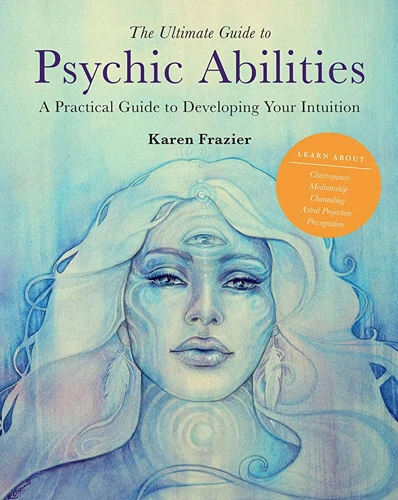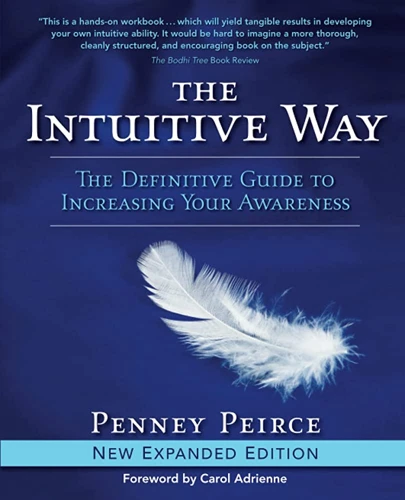As human beings, we all possess an inherent sense of intuition that allows us to make decisions and judgments based on our feelings rather than logic or reason. However, not everyone is able to tap into this innate ability and fully unlock their psychic potential. The question then arises – how can one enhance their intuition and psychic abilities? This is where dream journaling comes in. By keeping a record of our dreams and learning to interpret them, we can unlock a deeper understanding of our subconscious minds and strengthen our intuition. Join us on this journey to unravel the mysteries of the mind and discover the power of dream journaling.
What is Intuition?

Have you ever had a hunch or instinct about something that turned out to be correct? That’s your intuition at work. Intuition is a natural ability we all possess, but some people are more attuned to it than others. It can be difficult to describe or explain, as it’s a feeling or sense rather than a logical thought process. Some may even dismiss it as simply coincidence or luck. However, research shows that intuition is a valuable tool that can enhance decision-making and problem-solving abilities. So, let’s delve deeper into understanding intuition and how it relates to psychic abilities.
Understanding Intuition and Psychic Abilities
Intuition can be defined as a gut feeling or instinctual response that arises within us without any rational thought or logical reasoning. It is often described as a ‘knowing’ that comes from within, that cannot be tangibly explained or validated. Intuition is believed to be a natural human ability that we all possess to varying degrees.
On the other hand, psychic abilities refer to a set of unique skills that allow individuals to receive information not directly available to their five senses. Psychic abilities often include clairvoyance, telepathy and precognition. While intuition and psychic abilities have some similarities, there are notable differences between the two.
The main difference is that while intuition is a natural ability that everyone has to some extent, psychic abilities are considered to be more rare and specialized. Psychic abilities often require extensive training and practice to develop, while intuition is something that can be harnessed by anyone.
Another important difference is that intuition is often based on personal experiences and past knowledge, while psychic abilities involve receiving information from sources beyond the individual’s direct experience.
Despite these differences, both intuition and psychic abilities can be enhanced and developed through practices such as meditation and dream journaling. In fact, keeping a dream journal can be an effective way to tap into and develop both intuition and psychic abilities.
Intuition vs. Psychic Abilities
There is often confusion regarding the difference between intuition and psychic abilities. While they may seem like interchangeable terms, there are distinct differences between the two.
| Intuition | Psychic Abilities |
| — | — |
| Intuition is a sense of knowing or understanding something without relying on logic or evidence. It is a gut feeling or an inner voice that guides decision making. | Psychic abilities refer to a range of extrasensory perceptions, including clairvoyance, telepathy, precognition, and psychokinesis. These abilities allow a person to perceive information beyond the realm of normal sensory experience. |
| Intuition is a natural and innate human ability that everyone possesses to some degree. | Psychic abilities are less common and may require training or practice to develop. |
| Intuition is usually experienced on a personal level, providing insight into one’s own thoughts and feelings. | Psychic abilities can be used to access information beyond oneself, such as predicting future events or communicating with spirits. |
| Intuition is often associated with emotion and can be influenced by past experiences and cultural conditioning. | Psychic abilities are typically seen as objective and independent of personal biases or beliefs. |
While both intuition and psychic abilities involve tapping into inner sources of knowledge, they differ in their scope and application. Intuition is an everyday tool for decision making and problem solving, while psychic abilities are more specialized and may be used for spiritual or paranormal purposes. It’s important to recognize the distinct qualities of each and to determine which area you want to focus your attention on when seeking to enhance your natural abilities.
Why Use a Dream Journal to Enhance Intuition?

Have you ever had a dream that felt so real, it stuck with you for days? Or perhaps you’ve had a gut feeling about something but couldn’t quite explain why? These experiences are all linked to our intuition, the innate ability to understand or know something without conscious reasoning. But how can we tap into and enhance this intuition? One powerful tool is a dream journal. By keeping a record of our dreams, we can unlock insights, symbols, and patterns that connect to our intuition and psychic abilities. Let’s explore the psychological benefits of dream journaling and how it can help us enhance our intuition.
Psychological Benefits of Dream Journaling
Dream journaling offers various psychological benefits that can help improve your overall well-being. By recording your dreams, you can unlock hidden aspects of your psyche and gain deeper insights into your thoughts and emotions. The following table highlights some of the psychological benefits of dream journaling:
| Benefit | Description |
| Stress reduction | Recording your dreams can help you release any pent-up emotions or anxieties, leading to a reduction in overall stress levels. |
| Improved self-awareness | By analyzing your dreams, you can gain a deeper understanding of your own behaviors, emotions, and subconscious beliefs. |
| Enhanced creativity | Dream journaling can stimulate your imagination and foster creativity, as dreams often contain unexpected scenarios and symbols. |
| Emotional healing | Recording and analyzing your dreams can help you process unresolved emotions and traumas, leading to emotional healing and growth. |
| Improved memory | Keeping a regular dream journal can help improve your memory recall and overall cognitive function, as you exercise your brain to remember and analyze your dreams. |
| Increased self-reflection | Dream journaling encourages self-reflection and introspection, which can lead to personal growth and self-improvement. |
By taking advantage of these psychological benefits of dream journaling, you can greatly enhance your intuition and psychic abilities. Your dreams serve as a portal to your subconscious, and by unlocking their hidden messages, you can tap into your deepest intuition and unlock your full potential.
How Dreams and Intuition Connect
The connection between Dreams and Intuition is a topic that has fascinated many philosophers and scientists throughout history. Dreams are one of the primary ways that our subconscious mind communicates with us. When we are asleep, our conscious mind is at rest, and our subconscious mind is free to send us messages through symbols, emotions, and sensory experiences that we may not be able to access during waking life.
Intuition is often thought of as a “gut feeling” or a sense of knowing that is not necessarily based on logical reasoning. It is often described as a sixth sense or an extrasensory perception that allows us to access information beyond our five physical senses.
The connection between dreams and intuition lies in their shared language of symbolism and sensory experiences. Dreams provide a direct line of communication to our subconscious mind, which is where our intuition resides. By paying attention to the symbols and emotions that we experience in our dreams, we can begin to tap into our intuitive insights and access information that may not be readily available during waking life.
Additionally, keeping a dream journal can help us to develop our intuitive abilities by strengthening our ability to recall and interpret the messages that we receive during sleep. By developing a regular dream journaling practice, we can train our brain to be more receptive to these messages, and we can begin to recognize patterns and themes that offer insights into our inner psyche.
The connection between dreams and intuition is a powerful one, and by paying attention to the messages that we receive during sleep, we can unlock deeper insights into ourselves and the world around us.
| Dreams | Intuition |
|---|---|
| Symbols | Extrasensory perception |
| Emotions | Sixth sense |
| Sensory experiences | Gut feeling |
| Messages from subconscious mind | Access to information beyond physical senses |
| Direct line of communication to subconscious mind | Ability to tap into intuitive insights |
| Offers insights into inner psyche | Allows access to information not readily available during waking life |
Starting Your Dream Journal

Beginning a dream journal can be a daunting task. With so many options and techniques available, it can be overwhelming to know where to start. However, taking the first step is crucial in unlocking your intuition and enhancing your psychic abilities. By utilizing selected tools and setting intentions, you can begin your journey towards greater self-awareness and understanding. In this section, we will explore the initial steps to starting your dream journal, including selecting a journal, setting intentions, and developing a routine.
Selecting a Journal
When it comes to selecting a journal for dream journaling, there are several factors to consider. The journal you choose should be a reflection of your personal style and preferences. Here are some tips to help you select the perfect journal for your needs:
| Consideration | Suggestion |
| Size | Decide on the size that best suits you. If you plan to keep your journal at home, a larger size may be fine. If you plan to take it with you, a smaller size may be more practical. |
| Paper Quality | Choose paper that is thick enough to prevent ink from bleeding through, but not so thick that it makes the journal bulky. |
| Binding | Consider how you want your journal to be bound. Spiral-bound journals can easily lay flat, while hardbound journals offer durability. |
| Cover | Choose a cover that inspires you. It can be plain or decorative, based on your personal preferences. |
| Accessibility | Ensure that the journal is easily accessible when you are ready to record your dreams. Keep it in a place where you will see it regularly. |
By taking the time to choose a journal that meets your needs, you’ll be more likely to stick with your dream journaling routine. Don’t be afraid to experiment with different styles until you find the perfect fit for you.
Setting Intentions
When starting a dream journal to enhance intuition, it’s important to set intentions. These intentions act as a guide, helping you focus on your goals and intentions for your dream practice.
What are Intentions?
Intentions are a clear and conscious statement of what you want to achieve through your dream journaling practice. They help you stay focused, motivated, and aligned with your goals.
How to Set Intentions for Your Dream Journal
To set intentions for your dream journal, follow these steps:
| Step | Instructions |
|---|---|
| 1 | Reflect on why you want to keep a dream journal |
| 2 | Identify your goals and intentions for your dream practice |
| 3 | Write down your intentions in your dream journal |
| 4 | Repeat your intentions daily or whenever you start a new dream journal entry |
Remember to be specific with your intentions. For instance, you might set an intention to remember at least one dream per night, or to connect with your intuition through your dreams.
By setting intentions for your dream journal, you’ll be able to stay focused and motivated, and you’ll be more likely to achieve your goals. Additionally, the act of setting intentions will help you clarify your goals and get more specific about what you want to achieve through your dream practice.
Developing a Routine
Creating a routine for journaling your dreams can be helpful in establishing a consistent practice that can enhance your intuition and psychic abilities. Here are some steps you can take to develop your routine:
| Step | Description |
|---|---|
| Set a specific time | Choose a time during your day when you can sit down and focus on your dream journal without distractions. This could be in the morning before you start your day or in the evening before you go to bed. |
| Create a comfortable space | Select a location that makes you feel relaxed and at ease. Have your dream journal and writing tools nearby for easy access. |
| Clear your mind | Before you begin journaling your dreams, take a few deep breaths and try to clear your mind of any distractions. This will help you focus on your dreams and intuition. |
| Review your dreams | Take some time to review your dreams from the previous night, reading through any notes you may have taken. This will help you remember important details and symbols from your dreams. |
| Record your dreams | Using a structured entry, record as much detail as possible about your dreams. Make note of any symbols, colors, and emotions you experienced during your dreams. |
| Reflect on your dreams | After you have recorded your dreams, take some time to reflect on what they might mean. Consider any personal symbolism that may be hidden in the dream and how it may relate to your intuition and psychic abilities. |
By incorporating these steps into your routine, you can establish a consistent practice of recording and reflecting on your dreams, which can lead to a deeper understanding of your intuition and psychic abilities.
Recording Your Dreams

As we dive deeper into the world of dream journaling, one important aspect to focus on is the process of capturing your dreams. Many individuals struggle with remembering their dreams, let alone recording them in a way that is meaningful and decipherable. However, through dedication and practice, anyone can enhance their dream recall and create a structured entry that unlocks the vast potential of their subconscious mind. In this section, we will explore various tips and techniques to help you record your dreams with accuracy and clarity. So, let’s dive in and discover the art of recording your dreams!
Creating a Structured Entry
When creating a structured entry in your dream journal, it’s important to have a consistent format for each entry to make it easier to analyze and interpret your dreams later on. Here’s a suggested table you could use to structure your entries:
| Date: | Write the date of the dream here |
|---|---|
| Dream: | Record your dream in as much detail as possible |
| Feelings: | Write down any emotions you felt during the dream |
| Colors: | List any colors that stood out to you during the dream |
| Symbols: | Identify any symbols that appeared in your dream and write them down |
| Interpretation: | Take a few moments to reflect on the dream and write down any interpretations or insights you gain from it |
It’s important to include specifics like the date of the dream, the emotions you felt, the colors and symbols that stood out, as well as any interpretations or insights gained. This provides structure for your dream entries and makes them easier to analyze and interpret later on. With consistent and structured entries, you can build a strong foundation for unlocking your intuition and enhancing your psychic abilities.
Identifying Dream Symbols
When recording your dreams in a journal, it is important to identify and analyze the symbols present in your dreams. Symbols can be objects, actions, or even people that appear in your dreams and can have a deeper significance. Understanding the meaning behind dream symbols can help to unlock your intuition and enhance your psychic abilities.
Table: Common Dream Symbols
| Dream Symbol | Meaning |
|---|---|
| Water | Emotions or subconscious thoughts |
| Animals | Instincts or primal forces |
| Doors | Opportunities or transitions |
| Death | Endings or transformation |
| Flying | Freedoms or ambitions |
| Teeth | Self-image or confidence |
When analyzing dream symbols, it is important to consider their personal significance to you. A dream symbol may have a universal meaning, but it may also hold a specific and unique meaning for you based on your life experiences and personal beliefs.
In addition to identifying and analyzing dream symbols, it is also important to track recurring themes or patterns in your dreams. These recurring elements may also hold significance and add to your understanding of your subconscious mind and intuition.
By taking the time to identify and analyze dream symbols and themes, you can unlock a deeper understanding of your intuition and enhance your psychic abilities.
Using Colors and Emotions
When writing about your dreams in your dream journal, it’s important to pay attention to colors and emotions that appear in the dream. These elements can provide valuable insights into the meaning of the dream and any intuitive or psychic messages it may contain. Here are a few tips for effectively using colors and emotions in your dream journal:
- Pay attention to color symbolism: Colors can evoke different emotions and have specific meanings. For example, red can symbolize passion, energy, or anger, while blue can represent calmness, peace, or sadness. Take note of the colors that appear in your dreams and consider their potential meanings.
- Describe emotions in detail: Don’t just jot down that you felt “happy” or “scared” in your dream. Take the time to really describe the emotions you experienced, including how intense they were and what may have triggered them. This can help you better understand the underlying messages in your dream.
- Look for patterns: Do certain colors or emotions appear frequently in your dreams? If so, this may be a recurring theme or symbol that is important to pay attention to. Keep track of these patterns in your dream journal.
- Consider the context: The emotions and colors in your dream may be influenced by the setting, characters, and events that occur. Take note of these details and think about how they may be related to the emotions and colors in your dream.
Paying attention to colors and emotions in your dream journal can help you unlock deeper insights into your intuition and psychic abilities. By honing your ability to identify and interpret these elements, you can better understand the messages your subconscious mind is trying to convey.
Interpreting Your Dreams

Once you have a consistent record of your dreams, it’s time to delve into the intriguing and often mysterious process of interpreting them. Each dream has a unique story to tell, but it’s up to you to decipher its hidden meanings and symbolism. This can often feel like a daunting task, as dreams can be complex and obscure, leaving you with perplexity and uncertainty. However, with the right tools and techniques, interpreting your dreams can be a rewarding and enlightening experience. Let’s explore some ways to unlock the secrets of your dreams and understand their connection to your intuition and psychic abilities.
Understanding Personal Symbolism
One important aspect of dream journaling is understanding personal symbolism. Everyone has their own unique set of symbols and meanings that apply to their dreams. It’s important to identify and understand these symbols in order to accurately interpret and benefit from your dreams.
Here are some tips for understanding personal symbolism:
- Reflect on Your Personal Experiences: Your life experiences will shape the symbols and meanings that appear in your dreams. Think about events or people that have had a significant impact on you and consider how they may manifest in your dreams.
- Pay Attention to Emotions: Emotions are a key aspect of dream symbolism. How you feel during a dream can provide clues to its meaning. Notice if you feel happy, scared, overwhelmed, or any other strong emotions and consider what they may be representing.
- Look for Patterns: Do certain symbols or themes appear frequently in your dreams? Recognizing patterns can help you understand the deeper meanings behind your dreams and identify areas of your life that may need attention.
- Consider Context: The context of a dream can greatly impact its meaning. Take into account the setting, characters, and events that occur and how they relate to your waking life.
By understanding personal symbolism, you can unlock deeper meanings and insights from your dreams. It’s important to approach dream interpretation with an open and curious mindset, and to trust your intuition when it comes to understanding the messages your dreams are sending you.
Connecting Dreams to Intuition and Psychic Abilities
As previously discussed, dreams can hold a wealth of information about one’s subconscious thoughts and emotions. By keeping a dream journal and interpreting the symbols within, one can begin to connect their dreams to their intuition and psychic abilities. Here are some ways to make those connections:
| Technique | Description |
|---|---|
| Meditation and Reflection | The act of reviewing and analyzing dream symbols and themes can lead to deeper insights and intuitive connections. Taking time to reflect on dreams and their meanings can help a person tap into their psychic abilities. |
| Recognizing Patterns | By analyzing dream journals, a person can identify recurring symbols and patterns. This can help them understand what their intuition is trying to communicate to them. Paying attention to these patterns can lead to more accurate intuitive insights. |
| Trusting Instincts | Intuition is all about trusting one’s inner voice. By practicing following gut reactions in everyday life, a person can strengthen their intuition and make it easier to connect with their psychic abilities. Trusting one’s instincts can also help in interpreting dreams. |
| Acknowledging and Addressing Emotions | Emotions often hold important clues about one’s intuition and psychic abilities. By examining the emotions present in dreams, a person can better understand what their intuition is trying to tell them. Acknowledging and addressing emotions in waking life can also help strengthen psychic abilities. |
Making connections between dreams and intuition is an ongoing process that requires patience and practice. However, by incorporating techniques such as meditation, pattern recognition, trusting instincts, and addressing emotions, a person can enhance their psychic abilities and deepen their understanding of their inner self.
Trusting Your Intuition
Trusting your intuition can be challenging, especially if you have ingrained beliefs that go against it. However, learning to follow your gut can be beneficial in many ways. Here are a few tips to help you build trust in your intuition:
- Take note of when your intuition is right: Make a conscious effort to remember the times when your intuition has been correct. This will help you build confidence in your abilities.
- Practice: The more you use and trust your intuition, the stronger it will become. Start with small decisions, such as which route to take to work or what to order for lunch. As you build confidence, you can work your way up to bigger decisions.
- Let go of fear: Fear can cloud your intuition and prevent you from making the best decisions. Practice letting go of fear and trust that everything will work out as it should.
- Listen to your body: Your body is a powerful tool when it comes to intuition. Pay attention to how your body feels when you’re faced with a decision. Do you feel tense or relaxed? Do you feel a sense of excitement or dread? Trust these physical sensations to guide you.
- Follow your heart: Ultimately, your intuition comes from your heart. Listen to what your heart is telling you, even if it goes against logic or reason.
By taking these steps, you can begin to trust your intuition and make decisions that are in alignment with your true self. Remember, intuition is a skill that can be developed and strengthened over time.
Advanced Techniques for Enhancing Intuition and Psychic Abilities

As we explore the depths of our intuition and psychic abilities, it’s important to broaden our horizons and push beyond our current limitations. With a willingness to experiment and explore, we can begin to unlock the full potential of our inner guidance system. In this segment of the article, we’ll delve into some advanced techniques for enhancing intuition and psychic abilities beyond just dream journaling. So, fasten your seatbelts and let’s dive headfirst into this exciting realm of possibilities.
Lucid Dreaming
Lucid dreaming is a fascinating technique that can be used to enhance intuition and psychic abilities. In a lucid dream, the dreamer is aware that they are dreaming and is able to control the dream environment and their own actions within the dream. This can be a powerful tool for exploring and developing intuition and psychic abilities.
Benefits of Lucid Dreaming
– Enhanced Self-Awareness: Lucid dreaming can help individuals develop a greater sense of self-awareness and can be used to explore the inner workings of the subconscious mind.
– Greater Control: With lucid dreaming, individuals have greater control over their dream environment and can actively manipulate their dream experiences.
– Improved Memory: Lucid dreaming can help individuals improve their memory by providing an opportunity to practice remembering details and experiences within the dream.
Techniques for Lucid Dreaming
– Reality Checks: Throughout the day, ask yourself if you are dreaming or awake. By practicing this technique regularly, it can become habitual and you may start to perform these checks in your dreams, leading to a realization that you are dreaming.
– Mnemonic Induction of Lucid Dreams (MILD): Before falling asleep, repeat to yourself that you will have a lucid dream and imagine yourself becoming aware of the dream while within it.
– Wake-Back-to-Bed (WBTB): Wake up after sleeping for a few hours and spend some time awake before going back to sleep. This may increase the likelihood of having a lucid dream.
Using Lucid Dreaming for Intuition
Once in a lucid dream, individuals can use the dream environment to practice intuition and psychic abilities. This may involve asking dream characters for guidance, seeking out symbols or signs within the dream, or exploring alternate realities. By practicing these techniques within a lucid dream, individuals can strengthen their intuition and potentially gain insights into their waking life.
Cautionary Note: It is important to note that while lucid dreaming can be a powerful tool for self-exploration and personal growth, it can also have potential negative effects if not practiced safely. It is recommended to educate oneself on safe lucid dreaming practices and to approach the technique with caution.
Astral Projection
Astral projection refers to the process of separating your consciousness from your physical body and projecting it into the astral plane. This is also known as an out-of-body experience. It is believed that practicing astral projection can enhance your intuition and psychic abilities by allowing you to explore different dimensions and connecting with spiritual guides. Here are some advanced techniques you can use to practice astral projection:
- Meditation: Astral projection requires a deep state of relaxation and focus. Meditation can help you achieve this state by calming your mind and reducing physical and mental distractions.
- Binaural Beats: Listening to binaural beats can assist in inducing a meditative state and promoting astral projection. Binaural beats are recordings that contain different frequencies in each ear to create a desired brainwave pattern.
- Visualization: Visualize yourself leaving your physical body and traveling to different locations in the astral plane. Focus on the details of your surroundings and use all your senses to experience the environment.
- Spiritual Guides: Some individuals believe that they have spiritual guides who can assist them in astral projection. You can call on your spiritual guides to help you during your journey and protect you from negative energies.
It is important to note that astral projection can be a challenging and potentially dangerous practice. It is recommended that you research and seek guidance from experienced practitioners before embarking on this journey. As always, trust your intuition and proceed with caution.
Meditation and Visualization
One powerful way to enhance intuition and psychic abilities is through the use of meditation and visualization. These practices can help quiet the mind and connect with your inner intuition.
Meditation involves sitting quietly and focusing on your breath or a specific image or mantra. The goal is to clear the mind of distractions and enter a state of deep relaxation. Through regular practice, meditation can help increase self-awareness and strengthen intuition.
Visualization is a technique that uses the power of the imagination to create specific mental images. By visualizing yourself performing a desired outcome, you can increase your chances of achieving that outcome in reality. For example, if you want to improve your psychic abilities, you might visualize yourself connecting with your intuition and receiving accurate insights.
To incorporate meditation and visualization into your dream journal practice, try the following tips:
| Step | Description |
|---|---|
| 1 | Find a quiet, comfortable place to meditate and visualize. |
| 2 | Close your eyes and take several deep breaths to relax your body and mind. |
| 3 | Visualize yourself holding your dream journal and writing down your dreams. |
| 4 | Imagine your intuition guiding you as you interpret your dreams and connect with your higher self. |
| 5 | Focus on positive outcomes, such as increased intuition, vivid dreams, and helpful insights. |
| 6 | Repeat this visualization and meditation practice regularly to strengthen your intuition and psychic abilities. |
Remember, meditation and visualization take practice and patience. It’s normal to experience resistance or distractions at first, but with dedication and consistency, these techniques can become powerful tools for unlocking your intuition and enhancing your psychic abilities.
Common Dream Types and Their Meanings

Dreams have always been a source of fascination and wonder for mankind. They have been analyzed and interpreted for centuries, with many people believing that they hold deep meaning and messages from the subconscious or even the divine. It’s no wonder then that there are various types of dreams that people experience, each with their own unique characteristics and symbolism. In this section, we will explore some of the most common dream types and what they can mean for your intuition and psychic abilities. So, put on your dream analyst hat and prepare to dive into the mysterious world of dreaming!
Nightmares and Sleep Paralysis
Experiencing nightmares can be unsettling and leave you feeling anxious and afraid. While nightmares are a normal part of the dream cycle, recurring nightmares may be a sign of underlying stress or trauma. Keeping a dream journal can be a useful tool for identifying patterns in your nightmares and working towards resolving any underlying issues.
Sleep paralysis is a condition in which the body is temporarily immobilized during either the process of falling asleep or waking up. While this can be a frightening experience, it is not dangerous or harmful. Sleep paralysis can be linked to stress and anxiety but may also be a side effect of certain medications or sleep disorders.
If you experience nightmares or sleep paralysis, it may be helpful to try the following strategies:
| Strategy | Description |
|---|---|
| Grounding Techniques | When experiencing a nightmare or sleep paralysis, focus on your senses by feeling the weight of your body on the bed or noticing the sounds around you. This can help to ground you in reality and lessen the intensity of the experience. |
| Visualization | Before going to bed, visualize an image or scenario that brings you comfort and peace, such as a calm ocean or a serene forest. This can help to set a positive tone for your dreams and reduce the likelihood of nightmares or sleep paralysis. |
| Mindfulness Exercises | Practicing mindfulness exercises, such as deep breathing or meditation, can help to reduce overall stress and anxiety levels, which may in turn reduce the occurrence of nightmares and sleep paralysis. |
It is important to note that if nightmares or sleep paralysis occur regularly and significantly impact your daily functioning, it may be helpful to seek the support of a mental health professional.
Recurring Dreams
Have you ever experienced a dream that repeats itself night after night? Recurring dreams can be both fascinating and frustrating. Here are some things to keep in mind if you’re experiencing recurring dreams:
- Look for patterns: Take note of the similarities between each dream. Are there recurring themes or symbols?
- Consider your emotions: How do you feel during the dream? Do you have any strong emotions when you wake up?
- Reflect on your waking life: Are there any situations or experiences in your daily life that might be connected to the recurring dream?
Recurring dreams can provide valuable insights into our subconscious minds. By paying attention to the patterns and emotions present in these dreams, we can gain a better understanding of our inner selves and any unresolved issues that may be affecting us. It’s also important to remember that not all recurring dreams have a specific meaning and some may simply be a result of our brain processing information while we sleep. However, if you’re feeling stuck or troubled by these dreams, consider speaking with a therapist or dream analyst who can offer guidance and support.
Prophetic Dreams
Prophetic dreams are perhaps the most mysterious of all dream types. These dreams are said to offer glimpses into the future or present situations beyond what the dreamer could have known through normal means. While skeptics may dismiss prophetic dreams as mere coincidence or wishful thinking, believers see them as powerful tools for receiving guidance and insights from the universe.
Prophetic dreams can take many forms and may contain different types of information, such as upcoming events, future relationships, or even profound insights about the self. Some common themes in prophetic dreams include warning messages, significant life changes, and long-awaited resolutions.
The interpretation of prophetic dreams can be particularly challenging, as their meaning may not be immediately clear to the dreamer. However, by paying attention to details and using intuition, it is possible to discern the message hidden within the dream. Here are some tips for interpreting prophetic dreams:
| Tip 1: | Pay attention to vivid and unusual details in the dream, as they often hold clues to the dream’s meaning |
| Tip 2: | Consider the emotions felt in the dream, as they may indicate the importance of the message conveyed |
| Tip 3: | Look for connections between the dream and your waking life, as they may offer insights into current or upcoming events |
| Tip 4: | Trust your intuition and inner guidance, as they may be the key to understanding the dream’s significance |
It is important to note that not all dreams are prophetic in nature, and not all prophetic dreams will come true. However, by keeping an open mind and practicing intuition, dreamers can harness the power of prophetic dreams to gain insights and guidance for their waking lives.
Troubleshooting Your Dream Journal
Keeping a dream journal can be an incredibly rewarding practice, but it can also come with its fair share of challenges. As much as you may be excited to dive into the world of dream interpretation and exploring your intuition through your dreams, you may also find yourself facing writer’s block, frustration, and even nightmares that can make the process feel overwhelming. However, these challenges don’t have to derail your dream journal practice completely. With a bit of perseverance and some helpful tips and tricks, you can overcome these obstacles and continue your journey towards unlocking your intuition and enhancing your psychic abilities through your dreams. Let’s explore some common troubleshooting techniques to help you tackle any roadblocks that may arise in your dream journal.
Overcoming Writer’s Block
Writer’s block is a common frustration that can hinder the progress of any dream journal. Here are some strategies for overcoming writer’s block:
1. Take a break: When you’re feeling stuck, taking a break from writing can help. Give yourself a few minutes or hours to rest and recharge before returning to your journal.
2. Try a different approach: If your current way of recording your dreams is not working, try a different approach. For example, you could try drawing or sketching your dream instead of writing about it.
3. Focus on emotions: Sometimes it’s difficult to remember specific details of a dream, but focusing on the emotions you felt during the dream can help you get started.
4. Use prompts: Look up dream journaling prompts online, or create your own list of prompts to jumpstart your writing.
5. Don’t worry about being perfect: Remember that your dream journal is for personal use and growth, not for publication. Don’t worry about being perfect or using impeccable grammar.
By implementing these strategies, you can overcome writer’s block and get back to recording your dreams. Remember that it’s normal to experience frustration at times, but the benefits of dream journaling make it worth it in the end.
Coping with Frustration
Feeling frustrated with your dream journal is a common experience. You may feel like you’re not making progress, or that your dreams simply aren’t significant enough. However, it’s important to remember that developing intuition and enhancing psychic abilities is a gradual process. Here are some tips for coping with frustration while keeping your motivation high:
| Tip #1: | Take a break. Sometimes, stepping away from your dream journal and taking a break is the best thing you can do. When you return, you may have a fresh perspective and renewed energy. |
| Tip #2: | Be patient with yourself. Remember that developing intuition and psychic abilities takes time, effort, and practice. Don’t put too much pressure on yourself to have immediate results. |
| Tip #3: | Practice self-care. Make sure to take care of yourself physically, emotionally, and mentally. This includes getting enough sleep, eating healthy, and doing activities that bring you joy and relaxation. |
| Tip #4: | Change up your routine. If you feel like your current approach to dream journaling isn’t working, try something new. Experiment with different techniques, or try recording your dreams at a different time of day. |
| Tip #5: | Stay open-minded. Remember that intuition and psychic abilities are complex and mysterious. Don’t give up on your dreams or dismiss them as insignificant. Stay curious and open to new insights. |
By following these tips, you can cope with frustration while maintaining your motivation to unlock your intuition and enhance your psychic abilities. Don’t be discouraged if you experience setbacks or challenges – with dedication and perseverance, you can achieve your goals.
Dealing with Nightmares
Nightmares can be a common occurrence when keeping a dream journal, but they can also be distressing and unsettling. Here are some strategies for dealing with nightmares:
- Acknowledge your emotions: It’s important to recognize and validate any fear or anxiety you may have experienced during the nightmare. Avoiding these emotions can make them worse.
- Journal about the nightmare: Write down as much detail as possible about the nightmare, including any emotions you felt. This can help you process and understand the underlying fears or concerns that may have contributed to the nightmare.
- Visualize a more positive outcome: After journaling about the nightmare, take some time to imagine a more positive ending or outcome to the dream. This can help to remove some of the power and fear associated with the nightmare.
- Try relaxation techniques: Deep breathing, progressive muscle relaxation, or meditation can help to calm the body and mind after a nightmare.
- Talk to a trusted person: Sharing your nightmare with a trusted friend or therapist can help to alleviate some of the fear and anxiety associated with the experience.
- Consider seeking professional help: If nightmares are a recurring or persistent problem, it may be beneficial to talk to a mental health professional to address any underlying issues that may be contributing to the nightmares.
Remember, nightmares are a normal part of the dream process, and they do not necessarily indicate a deeper underlying problem. By acknowledging your emotions, writing about the experience, and seeking support when necessary, you can effectively cope with any nightmares that may occur.
Conclusion
As we come to the end of our exploration into unlocking intuition through dream journaling, it’s hard not to feel a sense of awe at the vast depths of our subconscious minds. Throughout this journey, we’ve learned about the power of dreams, intuition, and psychic abilities, and how we can use a dream journal to tap into this hidden realm within us. From setting intentions to interpreting symbols and exploring advanced techniques, we’ve covered a lot of ground. As we wrap up, let’s take a moment to reflect on what we’ve learned and how we can continue to use these tools to enrich our lives.
Recap of Key Points
As we come to the end of this article, it’s important to recap some of the key points made about unlocking your intuition through dream journaling. Here are some of the main takeaways:
- Intuition is a natural ability that everyone possesses. It can be enhanced through practices like dream journaling and meditation.
- Dream journaling is a powerful tool for connecting with your intuition. By recording and analyzing your dreams, you can uncover insights and symbols that are important to your waking life.
- It’s important to develop a consistent routine for dream journaling. This might mean recording your dreams immediately upon waking, before you get out of bed.
- Pay attention to symbols and themes in your dreams. Colors, emotions, and recurring symbols can provide important clues about your subconscious mind.
- Don’t be afraid to trust your intuition and explore advanced techniques like lucid dreaming and astral projection. These practices can help you access even deeper levels of insight and clarity.
- Common dream types like nightmares and prophetic dreams can provide valuable information about yourself and the world around you. By analyzing these dreams, you can gain a better understanding of your fears and aspirations.
- It’s important to be patient and compassionate with yourself when starting a dream journaling practice. Remember that this is a journey, and there will be ups and downs along the way.
By following these key points and committing to a regular dream journaling practice, you can unlock the full potential of your intuition and live a more meaningful, fulfilling life.
Go Forth and Dream!
Now that you have a better understanding of how to unlock your intuition and enhance your psychic abilities through your dream journal, it’s time to put your newfound knowledge into practice. Remember, this is a journey of self-discovery, so be patient with yourself as you develop your skills.
Here are some key takeaways to keep in mind as you continue on your path:
| Focus on Your Intentions: | Before going to bed each night, take a few moments to set your intentions for what you hope to gain from your dreams. Visualize yourself recording vivid and meaningful dreams in your journal, and trust that your subconscious will guide you toward the insight and guidance you seek. |
| Stay Consistent: | Make dream journaling a regular habit, even if you’re feeling tired or uninspired. Keeping a consistent routine will encourage your mind to view dreamtime as a reliable source of information and inspiration. |
| Be Creative: | Don’t be afraid to experiment with different methods of recording and interpreting your dreams. Use colors, creative writing, and other techniques to express your dreams in a way that resonates with you. |
| Trust Your Intuition: | Your intuition is a powerful tool that can help guide you toward the insights and opportunities you seek. Trust your gut feelings and don’t be afraid to follow your instincts, even if they don’t make immediate sense. |
| Stay Open-Minded: | Remember that the messages and symbols of your dreams may not always be obvious or easy to understand. Keep an open mind as you explore the meanings behind your dreams and trust that your subconscious is leading you toward greater understanding. |
| Keep Learning: | There’s always more to discover when it comes to unlocking your intuition and enhancing your psychic abilities. Be curious, read books, attend workshops, and seek out other resources to help deepen your understanding. |
With these tips in mind, you’re ready to embark on an exciting journey of self-discovery through your dreams. So go forth and dream, and trust that the wisdom and guidance you seek is already within you.
Frequently Asked Questions
How do dreams relate to intuition and psychic abilities?
Dreams can offer insights into our unconscious thoughts, feelings, and desires, which are all connected to our intuition and psychic abilities. By keeping a dream journal and analyzing dream symbolism, we can better understand and enhance our intuitive and psychic powers.
Can anyone develop psychic abilities?
Yes, everyone has the potential to develop their psychic abilities. It just takes practice, patience, and a willingness to explore and trust your intuition.
Is it necessary to record dreams in a journal?
No, it’s not necessary, but it can be incredibly helpful for enhancing intuition and psychic abilities. Dream journaling allows for greater self-awareness, reflection, and analysis, which can lead to deeper insights and intuitive connections.
What should I do if I can’t remember my dreams?
Try setting an intention before bedtime to remember your dreams. Keep a notepad and pen nearby to jot down any fragments or impressions upon waking. Creating a dream-friendly environment, practicing relaxation techniques before sleep, and abstaining from alcohol or substances can also improve dream recall.
What’s the difference between intuition and psychic abilities?
Intuition is the natural ability to understand or sense something without conscious reasoning, while psychic abilities refer to the use of extrasensory perception to receive information or communicate beyond the physical realm. Both involve accessing and trusting one’s inner knowing.
Can dreams predict the future?
While some individuals may experience prophetic dreams that seemingly predict the future, it’s important to approach these experiences with a healthy degree of skepticism and critical analysis. Dreams are not always literal and can be symbolic or subjective.
What is lucid dreaming and how can it enhance intuition?
Lucid dreaming is the ability to become aware that you are dreaming and to consciously direct the dream narrative. By practicing lucid dreaming techniques, individuals can improve their dream recall, engage in intentional dream work, and develop greater self-awareness and intuition.
What is astral projection and how is it related to intuition?
Astral projection is the experience of separating one’s consciousness from the physical body and traveling in an astral plane. Some individuals believe that astral projection can enhance intuition and psychic abilities by allowing individuals to access higher levels of consciousness and spiritual realms.
How can I cope with nightmares?
If nightmares are causing distress or interfering with daily life, it’s important to seek professional help. Keeping a dream journal, practicing relaxation techniques, and creating a comforting sleep environment can also help reduce the frequency and intensity of nightmares.
Do dream symbols have universal meanings?
While some dream symbols may have universal meanings based on cultural, archetypal, or mythological associations, it’s important to approach dream symbolism from a personal and subjective perspective. The same symbol can hold different meanings and associations for different individuals.








